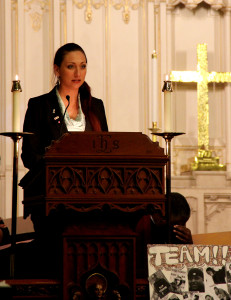After celebrating the renewal of the federal Violence Against Women Act, some Syracuse anti-violence advocates are now lobbying local politicians to pass two pieces of legislation that they say are crucial to protecting victims and increasing the reporting of violence.
“We think it’s very important for politicians to hear personal stories, to help them see these laws are going to influence somebody that I work with personally, change their lives and provide safety,” said Kiersten Curtis, who works as a victims’ advocate at Syracuse anti-violence group Vera House. She also participated in the lobbying effort.
On April 22, five social workers from Vera House went to Albany to lobby state senators and assemblymen to overhaul the process of granting bail to those accused of violent crimes. They want two measures that would:
- Require judges to take public safety into account when making decisions granting bail.
New York state judges now only consider the risks of defendants fleeing the country. Toughing bail requirements can reduce the chances of retaliations against victims, advocates say, so victims don’t need to worry about their personal safety when reporting crimes.
“It offers protection that we need, protections that you would think should be a given, but in reality is not,” said Kiersten Curtis, one of five lobbying members and a victims’ advocate at Vera House.
New York State is one of four states that do not have this law, said Curtis.
- Require domestic violence offenders to forfeit bail when violating court orders of protection.
Restraining orders, or orders of protection, are used in domestic violence cases to safeguard victims. Under this new bill, once the order is broken, the money that was paid for bailing must be fully returned to the court. This financial punishment, advocates say, will serve as an extra deterrent to second-time violence.
As justification for the measures, advocates often cite statistics on the frequency of violence against women. Every two minutes, for example, someone in the United States is sexually assaulted, according to the Rape, Abuse, Incest National Network, or RAINN. It is a national anti-sexual violence group. But less than half of those crimes were reported. RAINN estimates that 54 percent of sexual assaults are not reported to police. About 9 percent of accused rapists are prosecuted and 3 percent are jailed.
On March 7, President Barack Obama signed an expansion of the Violence Against Women Act into law. The act, first enacted 1995, focuses by strengthening penalties for rapists who repeat their offenses, increasing rates of prosecution and sentencing, and providing victims financial support.
The Violence Against Women Act has been applauded by women’s rights advocates and social workers. But changing the laws is not enough, advocates say. They call for more education and awareness programs to spread knowledge about help that already exists.
The Onondaga County District Attorney’s Office has the Victim Assistance Program that gives emotional, legal and financial support assistance to victims and their families. People can file for the state crime victims compensation. It covers expenses of medical treatments, counseling and other related services. In addition, Syracuse police have a special unit to help victims who suffer from chronic domestic violence.
“We need to let people know there are services available in our community,” said Helena Lamb, another advocate at Vera House. “They don’t have to go behind closed doors and cry alone.”
(Maya Gao Qian is a graduate student in magazine, newspaper and online journalism.)
-30-



